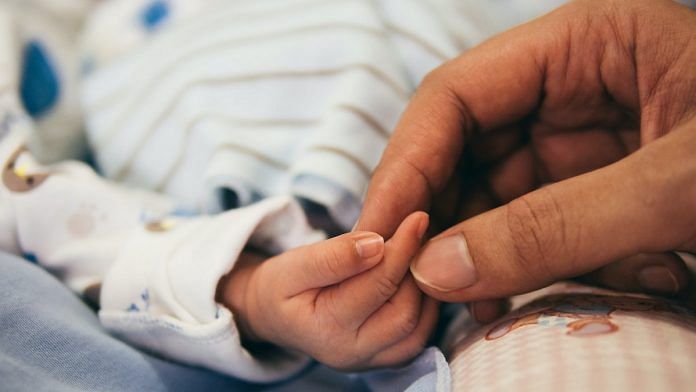New Delhi: The Supreme Court Tuesday decided against the rights of same-sex couples and people in live-in relationships to adopt children, holding that the clause restricting adoption to married couples does not violate the Constitution.
This was the majority decision (3:2) of a five-judge bench looking into a batch of writ petitions seeking the legalisation of same-sex marriage in India.
The petitioners had said that same-sex couples must have a right to adopt children. They had challenged Section 57 of the Juvenile Justice Act read with the 2022 Adoption Regulations, issued by the Women and Child Development Ministry.
The latter allowed the adoption authority — CARA or Central Adoption Resource Authority — to place additional conditions, and the agency subsequently restricted adoption to couples who have been in a “stable marital relationship” for two years.
The two separate minority decisions, written by Chief Justice of India D.Y. Chandrachud and Justice S.K. Kaul, said the adoption authority exceeded its powers by prescribing the additional requirement of “marriage” for adoption. There was no reasonable argument for this distinction between married and unmarried couples, they added.
However, the provision will continue to be law as the majority — Justices Ravindra Bhat, P.S. Narasimha, and Hima Kohli — held it to be constitutional.
They went so far as to say the CJI’s interpretation would have “disastrous consequences” because the law as it exists would be unable to guarantee the child’s interests in case of breakdown of the relationship, which is not the case with heterosexual couples.
ThePrint explains the court’s decision and the adoption provision held unconstitutional by the CJI and Justice Kaul.
2015 Act, nodal agency & ‘eligible’ parents
Parliament enacted the Juvenile Justice Act in 2015 to provide the primary framework for juvenile justice in the country, replacing earlier child welfare legislation.
Under the Ministry of Women and Child Development, the Act established CARA as the nodal agency to process in-country and inter-country adoptions.
Section 57 provides for the eligibility of prospective parents and requires that they be “physically fit, financially sound, and mentally alert”. It also requires the consent of both spouses. In case there is only one adoptee, there are additional regulations (including restrictions on single males adopting girl child).
The Act further provides that CARA can frame additional regulations for adoption of children. In exercise of this power, the Women & Child Ministry issued the 2022 Adoption Regulations, which restricted adoption by couples to those in a marital relationship.
“No child shall be given in adoption to a couple unless they have at least two years of stable marital relationship except in the cases of relative or step-parent adoption,” the 2022 regulations, which were under challenge, said.
‘Live-in not stable relationship, can’t allow adoption’
The petitioners had also contended that, through a 2022 CARA Office Memorandum, individuals in live-in relationships were specifically excluded from adopting a child.
“The authority would like the children to be placed only with the stable family and single applicant in a live-in relationship cannot be considered as stable family,” the memo had read.
It was argued before the court that this had resulted in an anomalous situation where a single individual, who may be a homosexual, may adopt a child individually, but not as a couple.
Married heterosexual couples & parenting
In his minority decision, Justice Chandrachud held that the 2022 regulations were violative of the Constitution, and read down (removed) the word marital from the clause.
He said no evidence was presented to show that only married heterosexual couples could make good parents, and the law cannot assume the same as well.
The JJ Act does not bar adoption by an unmarried couple, while the 2022 regulations do, and CARA has thus exceeded its authority by prescribing such a requirement, the CJI said. The use of the word “stable” for a marital relationship is vague and exceeds the powers provided to CARA by the JJ Act, he added.
He also found the provision to be violative of Article 14 of the Constitution, saying it does not have a “rational nexus (connection)” with the object sought to be achieved by the Act, which is the best interest of the child.
Justice Chandrachud noted that the petitioners’ case was not one of their “fundamental” right to adopt, but only that the regulation in question is discriminatory to the queer community.
Even though it looks “facially” neutral, it disproportionately affects and furthers the disadvantage to the queer community as one is forced to either be in a loving relationship or adopt a child, he said.
“The CARA circular has exceeded the scope of the Adoption Guidelines and the JJ Act,” Justice Chandrachud observed.
Justice Kaul agreed with Justice Chandrachud’s observations.
The other three judges, however, said the provision was not violative of the Constitution.
(Edited by Sunanda Ranjan)
Also Read: Neither ‘urban’ nor ‘elitist’ — what data shows about Indians’ views on same-sex relationships



